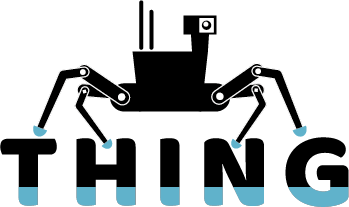THE UNIVERSITY OF EDINBURGH (UEDIN)![]()
 Michael Mistry — Reader in Robotics at the School of Informatics, University of Edinburgh, where I am also a member of the Institute for Perception, Action and Behaviour. I am also affiliated with the School of Computer Science, University of Birmingham. I am broadly interested in human motion and humanoid robotics. My research focuses on issues relevant to dexterous movement in both humans and humanoid robots, including redundancy resolution and inverse kinematics, operational space control and manipulation, stochastic optimal control, and internal model learning and control, particularly in environmental contact. Previously, I have been a postdoc at the Disney Research Lab at Carnegie Mellon University, a researcher at the ATR Computational Neuroscience Lab, and a Phd student in Stefan Schaal’s CLMC lab at the University of Southern California.
Michael Mistry — Reader in Robotics at the School of Informatics, University of Edinburgh, where I am also a member of the Institute for Perception, Action and Behaviour. I am also affiliated with the School of Computer Science, University of Birmingham. I am broadly interested in human motion and humanoid robotics. My research focuses on issues relevant to dexterous movement in both humans and humanoid robots, including redundancy resolution and inverse kinematics, operational space control and manipulation, stochastic optimal control, and internal model learning and control, particularly in environmental contact. Previously, I have been a postdoc at the Disney Research Lab at Carnegie Mellon University, a researcher at the ATR Computational Neuroscience Lab, and a Phd student in Stefan Schaal’s CLMC lab at the University of Southern California.
POZNAN UNIVERSITY OF TECHNOLOGY (PUT)![]()
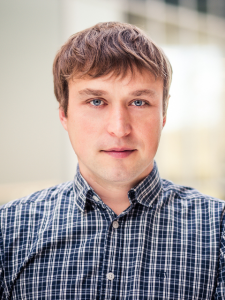 Krzysztof Walas — Assistant Professor at Poznan University of Technology. From 08.2014 till 09.2015 he was on a sabbatical leave (research fellow) at The University of Birmingham, Intelligent Robotics Laboratory (FP7 project PaCMan). His main research interest is on perception for robotics. He was a project leader in a research on multi-modal perception for compliant ground negotiation and currently he is a leader of the project on manipulation of elastic objects. During his stay at the University of Birmingham his main research focus was on compositional representations of objects in 3D. Krzysztof Walas was involved as an investigator in 2 EU and 3 national projects. His implementation skills were proven in the successful completion of 3 six-legged robotic platforms.
Krzysztof Walas — Assistant Professor at Poznan University of Technology. From 08.2014 till 09.2015 he was on a sabbatical leave (research fellow) at The University of Birmingham, Intelligent Robotics Laboratory (FP7 project PaCMan). His main research interest is on perception for robotics. He was a project leader in a research on multi-modal perception for compliant ground negotiation and currently he is a leader of the project on manipulation of elastic objects. During his stay at the University of Birmingham his main research focus was on compositional representations of objects in 3D. Krzysztof Walas was involved as an investigator in 2 EU and 3 national projects. His implementation skills were proven in the successful completion of 3 six-legged robotic platforms.
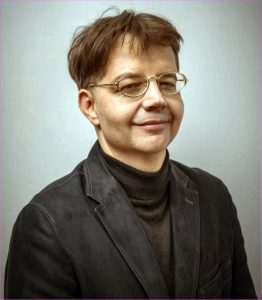 Piotr Skrzypczynski — received the Ph.D. and D.Sc. degrees in Robotics from Pozna\’n University of Technology (PUT) in 1997 and 2007, respectively. Since 2010 he is an associate professor at the Institute of Control, Robotics and Information Engineering (ICRIE) of PUT, and head of the Mobile Robotics Laboratory at ICRIE.
Piotr Skrzypczynski — received the Ph.D. and D.Sc. degrees in Robotics from Pozna\’n University of Technology (PUT) in 1997 and 2007, respectively. Since 2010 he is an associate professor at the Institute of Control, Robotics and Information Engineering (ICRIE) of PUT, and head of the Mobile Robotics Laboratory at ICRIE.
He is author or co-author of over 160 technical papers in robotics and computer science. His current research interests include: autonomous mobile robots, simultaneous localization and mapping, multisensor fusion, machine learning, and computational intelligence in robotics.
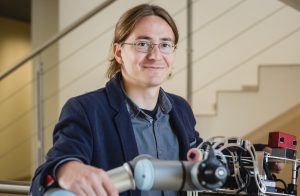 Dominik Belter — graduated from the Poznan University of Technology (2007). He received PhD degree in robotics from the same University in 2012. Since 2012, he works as an Assistant Professor at the Institute of Control, Robotics and Information Engineering of the Poznan University of Technology. Dominik Belter is the author or co-author of over 60 technical papers in the fields of robotics and computer science. His research interests include walking robots, machine learning and computer vision.
Dominik Belter — graduated from the Poznan University of Technology (2007). He received PhD degree in robotics from the same University in 2012. Since 2012, he works as an Assistant Professor at the Institute of Control, Robotics and Information Engineering of the Poznan University of Technology. Dominik Belter is the author or co-author of over 60 technical papers in the fields of robotics and computer science. His research interests include walking robots, machine learning and computer vision.
 Antonio Bicchi — is Professor of Robotics at the University of Pisa, and Senior Scientist at the Italian Institute of Technology in Genoa. He graduated from the University of Bologna in 1988 and was a postdoc scholar at M.I.T. Artificial Intelligence lab in 1988–1990. He teaches Control Systems and Robotics in the Department of Information Engineering (DII) of the University of Pisa. He leads the Robotics Group at the Rearch Center „E. Piaggio” of the University of Pisa since 1990, where he was Director from 2003 to 2012. He is the Head of the SoftRobotics Lab for Human Cooperation and Rehabilitation at IIT in Genoa. Since 2013 he serves ad Adjunct Professor at the School of Biological and Health Systems Engineering of Arizona State University. His main research interests are in Robotics, Haptics, and Control Systems in general. He has published more than 400 papers on international journals, books, and refereed conferences. He is Editor-in-Chief of the IEEE Robotics and Automation Letters, which he founded in 2015.
Antonio Bicchi — is Professor of Robotics at the University of Pisa, and Senior Scientist at the Italian Institute of Technology in Genoa. He graduated from the University of Bologna in 1988 and was a postdoc scholar at M.I.T. Artificial Intelligence lab in 1988–1990. He teaches Control Systems and Robotics in the Department of Information Engineering (DII) of the University of Pisa. He leads the Robotics Group at the Rearch Center „E. Piaggio” of the University of Pisa since 1990, where he was Director from 2003 to 2012. He is the Head of the SoftRobotics Lab for Human Cooperation and Rehabilitation at IIT in Genoa. Since 2013 he serves ad Adjunct Professor at the School of Biological and Health Systems Engineering of Arizona State University. His main research interests are in Robotics, Haptics, and Control Systems in general. He has published more than 400 papers on international journals, books, and refereed conferences. He is Editor-in-Chief of the IEEE Robotics and Automation Letters, which he founded in 2015.
 Manolo Garabini — graduated in Mechanical Engineering in 2010 and completed his PhD in Robotics in 2014. He is currently part of the robotics research group at the „E.Piaggio” Research Centre led by Professor Antonio Bicchi. His main research interests are the design and control of Soft Robots: robots in which elastic elements, with fixed or variable mechanical characteristics, are included in the structure to confer characteristics of robustness, dynamics, and adaptivity compared to calssic rigid robots. Among other activities, he collaborated on the creation of a modular soft robotic platform, the qbmoves, the Pisa/IIT SoftHand robotic hand, and the humanoid robot Walk-Man, which represented Italy in the DARPA Robotics Challenge in the summer of 2015.
Manolo Garabini — graduated in Mechanical Engineering in 2010 and completed his PhD in Robotics in 2014. He is currently part of the robotics research group at the „E.Piaggio” Research Centre led by Professor Antonio Bicchi. His main research interests are the design and control of Soft Robots: robots in which elastic elements, with fixed or variable mechanical characteristics, are included in the structure to confer characteristics of robustness, dynamics, and adaptivity compared to calssic rigid robots. Among other activities, he collaborated on the creation of a modular soft robotic platform, the qbmoves, the Pisa/IIT SoftHand robotic hand, and the humanoid robot Walk-Man, which represented Italy in the DARPA Robotics Challenge in the summer of 2015.
EIDGENOESSISCHE TECHNISCHE HOCHSCHULE ZUERICH (ETH)
 Marco Hutter — is assistant professor for Robotic Systems at ETH Zurich and Branco Weiss Fellow. He is part of the national competence centers for robotics (NCCR robotics) and digital fabrication (NCCR dfab), and member of the Intel Network on Intelligent Systems. His group is participating in several research projects, industrial collaborations, and international competitions that target the application of high-mobile autonomous vehicles in challenging environments such as for search and rescue, industrial inspection, or construction operation. Marco’s research interests are in the development of novel machines and actuation concepts together with the underlying control, planning, and optimization algorithms for locomotion and manipulation.
Marco Hutter — is assistant professor for Robotic Systems at ETH Zurich and Branco Weiss Fellow. He is part of the national competence centers for robotics (NCCR robotics) and digital fabrication (NCCR dfab), and member of the Intel Network on Intelligent Systems. His group is participating in several research projects, industrial collaborations, and international competitions that target the application of high-mobile autonomous vehicles in challenging environments such as for search and rescue, industrial inspection, or construction operation. Marco’s research interests are in the development of novel machines and actuation concepts together with the underlying control, planning, and optimization algorithms for locomotion and manipulation.
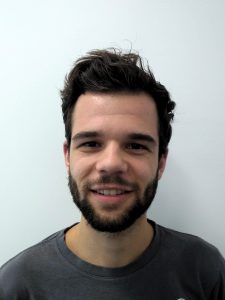 Ruben Grandia — is a Ph.D. student at the Robotic Systems Lab of ETH Zurich and a member of the Intel Network on Intelligent Systems. He received his BSc. in Aerospace Engineering from Delft University of Technology in 2014 and his MSc. in Robotic, Systems, and Control from ETH Zurich in 2017. Ruben’s research is focused on trajectory optimization for robot locomotion in unstructured terrain. He is interested in increasing the autonomy of legged robots by developing algorithms that combine classical control methods with learning techniques.
Ruben Grandia — is a Ph.D. student at the Robotic Systems Lab of ETH Zurich and a member of the Intel Network on Intelligent Systems. He received his BSc. in Aerospace Engineering from Delft University of Technology in 2014 and his MSc. in Robotic, Systems, and Control from ETH Zurich in 2017. Ruben’s research is focused on trajectory optimization for robot locomotion in unstructured terrain. He is interested in increasing the autonomy of legged robots by developing algorithms that combine classical control methods with learning techniques.
 Giorgio Valsecchi — is a research engineer for Robotic Systems at ETH Zurich. He studied Aerospace and Industrial Engineering at Scuola Superiore Sant’Anna and Pisa University. After graduating he spent two years working on robotics solutions for civil and industrial infrastructure inspection. His research interests are in the design of robots for extreme environments, mobility concepts and novel mechanisms.
Giorgio Valsecchi — is a research engineer for Robotic Systems at ETH Zurich. He studied Aerospace and Industrial Engineering at Scuola Superiore Sant’Anna and Pisa University. After graduating he spent two years working on robotics solutions for civil and industrial infrastructure inspection. His research interests are in the design of robots for extreme environments, mobility concepts and novel mechanisms.
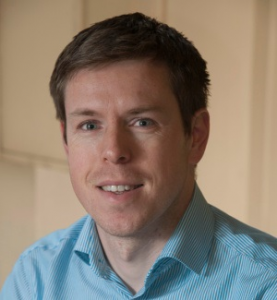 Maurice Fallon — is a Royal Society Research Fellow at the Oxford Robotics Institute (University of Oxford). His research is focused on probabilistic methods for localization and mapping. He has also made research contributions to state estimation on legged robots and is also interested in high dimensional motion planning and manipulation for walking robots. From 2013-2015 he was the perception lead on MIT’s DARPA Robotics Challenge team – a multi-year competition developing technologies for semi-autonomous humanoid exploration and manipulation in disaster situations. He co-leads the Dynamic Robot Systems Group (DRS) in ORI.
Maurice Fallon — is a Royal Society Research Fellow at the Oxford Robotics Institute (University of Oxford). His research is focused on probabilistic methods for localization and mapping. He has also made research contributions to state estimation on legged robots and is also interested in high dimensional motion planning and manipulation for walking robots. From 2013-2015 he was the perception lead on MIT’s DARPA Robotics Challenge team – a multi-year competition developing technologies for semi-autonomous humanoid exploration and manipulation in disaster situations. He co-leads the Dynamic Robot Systems Group (DRS) in ORI.
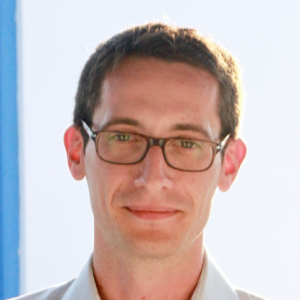 Ioannis Havoutis — is a Departmental Lecturer in Robotics at the Department of Engineering Science of the University of Oxford. He is part of the Oxford Robotics Institute (ORI) and a co-lead, of the Dynamic Robot Systems Group (DRS). He leads the research direction of robotic legged locomotion as his expertise lies in the design and implementation of algorithms that enable autonomous legged mobility. Previously he worked on learning complex skills by demonstration at the Idiap Research institute, while before he led the locomotion group within the Dynamic Legged Systems lab (HyQ team) at the Department of Advanced Robotics, IIT. His focus is on approaches for dynamic whole-body motion planning and control that allow robots with arms and legs to robustly operate in a variety of challenging domains.
Ioannis Havoutis — is a Departmental Lecturer in Robotics at the Department of Engineering Science of the University of Oxford. He is part of the Oxford Robotics Institute (ORI) and a co-lead, of the Dynamic Robot Systems Group (DRS). He leads the research direction of robotic legged locomotion as his expertise lies in the design and implementation of algorithms that enable autonomous legged mobility. Previously he worked on learning complex skills by demonstration at the Idiap Research institute, while before he led the locomotion group within the Dynamic Legged Systems lab (HyQ team) at the Department of Advanced Robotics, IIT. His focus is on approaches for dynamic whole-body motion planning and control that allow robots with arms and legs to robustly operate in a variety of challenging domains.
 Marco Camurri (Oxford) — is Post-Doctoral researcher at the Oxford Robotics Institute (University of Oxford). Previously, he was Post-Doctoral researcher at at the Dynamic Legged Systems Lab of the Istituto Italiano di Tecnologia (Italy), working on contact estimation and visual perception for gait adaptation on the dynamic quadruped HyQ. He received his PhD in 2017 at the same instute, with a thesis on Multi-Sensor State Estimation and Mapping on Dynamic Quadruped Robots. He has a MSc in Computer Engineering from University of Modena and Reggio Emilia (Italy). His research interests include: multi-sensor fusion for dynamic legged locomotion, contact estimation, and visual perception applied to dynamic locomotion
Marco Camurri (Oxford) — is Post-Doctoral researcher at the Oxford Robotics Institute (University of Oxford). Previously, he was Post-Doctoral researcher at at the Dynamic Legged Systems Lab of the Istituto Italiano di Tecnologia (Italy), working on contact estimation and visual perception for gait adaptation on the dynamic quadruped HyQ. He received his PhD in 2017 at the same instute, with a thesis on Multi-Sensor State Estimation and Mapping on Dynamic Quadruped Robots. He has a MSc in Computer Engineering from University of Modena and Reggio Emilia (Italy). His research interests include: multi-sensor fusion for dynamic legged locomotion, contact estimation, and visual perception applied to dynamic locomotion
QBROBOTICS SRL (QB) 
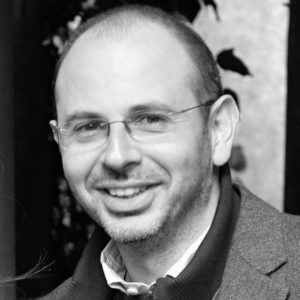 Fabio Bonomo — is the CEO of the company and will coordinate the activities referring mainly to the technical issues and devices development. Fabio Bonomo is an Engineer with a Master in Computer Science with a specialization in Robotics and Automation. He is an expert in embedded systems, rapid control prototyping, and the design and development of electronics hardware. He has been working in the Research Centre “E. Piaggio” since 2008 participating in EU-funded projects. In qbrobotics he is responsible also of the electronics development of the devices and he manages the supply chain as well.
Fabio Bonomo — is the CEO of the company and will coordinate the activities referring mainly to the technical issues and devices development. Fabio Bonomo is an Engineer with a Master in Computer Science with a specialization in Robotics and Automation. He is an expert in embedded systems, rapid control prototyping, and the design and development of electronics hardware. He has been working in the Research Centre “E. Piaggio” since 2008 participating in EU-funded projects. In qbrobotics he is responsible also of the electronics development of the devices and he manages the supply chain as well.
 Graziana Patanè — is the Administrative Assistant at qbrobotics® since 2015. She has achieved a Master in Publishing and a Master degree in Modern Literature. She is responsible of the management of the project from administrative and organizational point of view.
Graziana Patanè — is the Administrative Assistant at qbrobotics® since 2015. She has achieved a Master in Publishing and a Master degree in Modern Literature. She is responsible of the management of the project from administrative and organizational point of view.
 Alberto Brando — is an Engineer with a Master degree in Mechanical Engineering. He is the Production Manager at qbrobotics®. He is an expert in mechanical design and production processes, from traditional/CNC machining to rapid prototyping techniques. Alberto was the responsible, for the mechanical design and production, of the Pisa/IIT SoftHand. He will be responsible of the adaptative foot design and fabrication.
Alberto Brando — is an Engineer with a Master degree in Mechanical Engineering. He is the Production Manager at qbrobotics®. He is an expert in mechanical design and production processes, from traditional/CNC machining to rapid prototyping techniques. Alberto was the responsible, for the mechanical design and production, of the Pisa/IIT SoftHand. He will be responsible of the adaptative foot design and fabrication.
 Alessandro Raugi — is an Engineer with a Master degree in Robotic and Automation. He is Software and Firmware developer at qbrobotics® since 2015. He will be in charge of creation of software and electronic interfaces to integrate the adaptive foot.
Alessandro Raugi — is an Engineer with a Master degree in Robotic and Automation. He is Software and Firmware developer at qbrobotics® since 2015. He will be in charge of creation of software and electronic interfaces to integrate the adaptive foot.
ANYBOTICS AG (ANYB)![]()
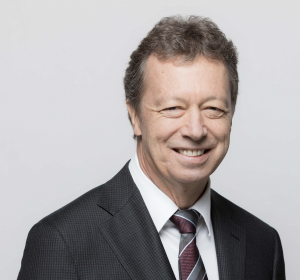 Hanspeter Faessler — is co-founder and Executive Chairman of the Zurich based startup company ANYbotics, developing autonomous mobile robots for harsh environments such as the legged robot ANYmal. Hanspeter wrote the first PhD thesis in robotics at ETH Zurich in 1989 and has a long business experience in various management roles in industry. In addition to running the business side of ANYbotics, he is today active as an independent advisor and board member in a number of companies.
Hanspeter Faessler — is co-founder and Executive Chairman of the Zurich based startup company ANYbotics, developing autonomous mobile robots for harsh environments such as the legged robot ANYmal. Hanspeter wrote the first PhD thesis in robotics at ETH Zurich in 1989 and has a long business experience in various management roles in industry. In addition to running the business side of ANYbotics, he is today active as an independent advisor and board member in a number of companies.
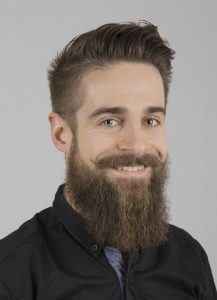 Péter Fankhauser — is co-founder and Chief Business Development Officer of the Zurich based startup company ANYbotics, developing autonomous mobile robots for harsh environments such as the legged robot ANYmal. During his doctoral degree at ETH Zurich, Péter developed mapping, planning, and control strategies for legged robots to climb over rough terrain. Péter graduated with a Master’s degree from ETH Zurich in 2012 and led a students team in the development of the ball-balancing robot Rezero, which he presented at TED Global in 2011.
Péter Fankhauser — is co-founder and Chief Business Development Officer of the Zurich based startup company ANYbotics, developing autonomous mobile robots for harsh environments such as the legged robot ANYmal. During his doctoral degree at ETH Zurich, Péter developed mapping, planning, and control strategies for legged robots to climb over rough terrain. Péter graduated with a Master’s degree from ETH Zurich in 2012 and led a students team in the development of the ball-balancing robot Rezero, which he presented at TED Global in 2011.
KGHM CUPRUM RESEARCH AND DEVELOPMENT CENTRE (CUP)
 Radosław Zimroz — received the M.Sc. degree in Acoustics from Institute of Telecommunication and Acoustics, Wroclaw University of Science and Technology, Poland (1998), the Ph.D. and the D.Sc. degrees in Mining and Geology from Faculty of Mining (WUST, 2002,2011, respectively). Since 2012 he serves as Professor and head of VibroAcoustic and Diagnostic Laboratory in this faculty. In 2012 he joined also KGHM Cuprum and now is leading Department of Systems Analysis. His main area of interest relates to model based and industrial Condition Monitoring of mining machines including such topics as signal acquisition systems, signal processing, multidimensional data analysis, adaptive decision making, especially in the context of non-stationary operating conditions. Recently he is also interested in application of robotics in mining industry, especially in using mobile inspection robots for maintenance of mining infrastructure. He is author of more than 300 works.
Radosław Zimroz — received the M.Sc. degree in Acoustics from Institute of Telecommunication and Acoustics, Wroclaw University of Science and Technology, Poland (1998), the Ph.D. and the D.Sc. degrees in Mining and Geology from Faculty of Mining (WUST, 2002,2011, respectively). Since 2012 he serves as Professor and head of VibroAcoustic and Diagnostic Laboratory in this faculty. In 2012 he joined also KGHM Cuprum and now is leading Department of Systems Analysis. His main area of interest relates to model based and industrial Condition Monitoring of mining machines including such topics as signal acquisition systems, signal processing, multidimensional data analysis, adaptive decision making, especially in the context of non-stationary operating conditions. Recently he is also interested in application of robotics in mining industry, especially in using mobile inspection robots for maintenance of mining infrastructure. He is author of more than 300 works.
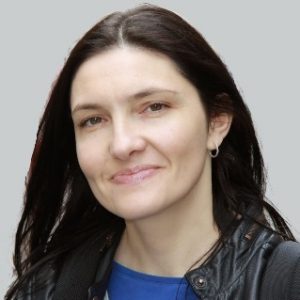 Agnieszka Wylomanska — received the M.Sc. degree in Financial and Insurance Mathematics from Institute of Mathematics and Computer Science at the Wroclaw University of Science and Technology (WUST, Poland) in 2002, the Ph.D. degree in Mathematics from WUST in 2006 and the D.Sc. degree in Mining and Engineering Geology from Faculty of Geoengineering, Mining and Geology (WUST, 2015). Currently she is a Professor with the Faculty of Pure and Applied Mathematics and a member of the Hugo Steinhaus Center for stochastic processes. Since 2016 she is working with Department of System Analysis in KGHM Cuprum. Her area of interest relates to time series analysis, stochastic modeling and statistical analysis of real data. She is an author of more than 100 research papers.
Agnieszka Wylomanska — received the M.Sc. degree in Financial and Insurance Mathematics from Institute of Mathematics and Computer Science at the Wroclaw University of Science and Technology (WUST, Poland) in 2002, the Ph.D. degree in Mathematics from WUST in 2006 and the D.Sc. degree in Mining and Engineering Geology from Faculty of Geoengineering, Mining and Geology (WUST, 2015). Currently she is a Professor with the Faculty of Pure and Applied Mathematics and a member of the Hugo Steinhaus Center for stochastic processes. Since 2016 she is working with Department of System Analysis in KGHM Cuprum. Her area of interest relates to time series analysis, stochastic modeling and statistical analysis of real data. She is an author of more than 100 research papers.
 Paweł K. Stefaniak — graduate in mining and geology in Faculty of Mining Science at the Wroclaw University of Science and Technology (WUST, Poland) in 2011, and the Ph.D. degree in Mining Transport from WUST in 2016. Currently he is Assistant Professor with KGHM CUPRUM R&D Centre Ltd. His research area is maintenance and management, diagnostics, efficiency analysis in mining sector. Recently he is also interesting in automation and robotics for mining industry, especially mobile robots for maintenance of infrastructure. He is an author of more than 40 scientific papers.
Paweł K. Stefaniak — graduate in mining and geology in Faculty of Mining Science at the Wroclaw University of Science and Technology (WUST, Poland) in 2011, and the Ph.D. degree in Mining Transport from WUST in 2016. Currently he is Assistant Professor with KGHM CUPRUM R&D Centre Ltd. His research area is maintenance and management, diagnostics, efficiency analysis in mining sector. Recently he is also interesting in automation and robotics for mining industry, especially mobile robots for maintenance of infrastructure. He is an author of more than 40 scientific papers.
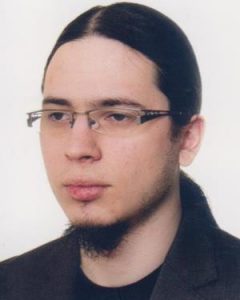 Jacek Wodecki — received the M.Sc. degree in Electronics from the Faculty of Electronics on Wroclaw University of Science and Technology, Wroclaw, Poland. PhD student in Diagnostics and Vibro-Acoustic Science Laboratory at Faculty of Geoengineering, Mining and Geology at Wroclaw University of Science and Technology.
Jacek Wodecki — received the M.Sc. degree in Electronics from the Faculty of Electronics on Wroclaw University of Science and Technology, Wroclaw, Poland. PhD student in Diagnostics and Vibro-Acoustic Science Laboratory at Faculty of Geoengineering, Mining and Geology at Wroclaw University of Science and Technology.
Since 2014 he works at KGHM CUPRUM R&D Ltd. Areas of interest: multivariate data analysis, multidimensional signal processing and machine learning, application of robotics in mining, especially using mobile robots for maintenance. He is an author of more than 20 research papers.
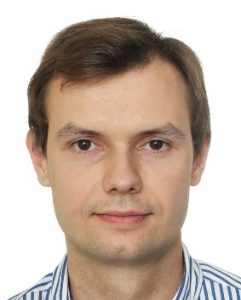 Piotr Kruczek — has a M. Sc degree in Mathematics for Industry and Commerce on Wroclaw University of Science and Technology, Poland (2015). Currently is a PhD student at Faculty of Pure and Applied Mathematics at Wroclaw University of Science and Technology. He works at KGHM CUPRUM R&D Ltd. He is an author of more than 15 research papers. His areas of interest are signal processing, applied mathematics, stochastic modelling and time series analysis.
Piotr Kruczek — has a M. Sc degree in Mathematics for Industry and Commerce on Wroclaw University of Science and Technology, Poland (2015). Currently is a PhD student at Faculty of Pure and Applied Mathematics at Wroclaw University of Science and Technology. He works at KGHM CUPRUM R&D Ltd. He is an author of more than 15 research papers. His areas of interest are signal processing, applied mathematics, stochastic modelling and time series analysis.
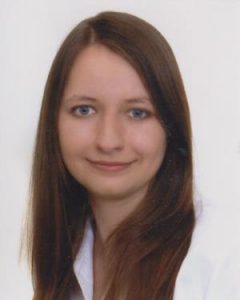 Anna Michalak — received the M.Sc. degree in Financial and Insurance Mathematics from the Faculty of Mathematics at the Wroclaw University of Science and Technology, Poland (2016). Works at KGHM CUPRUM R&D Ltd. Her areas of interest include: signal processing, financial mathematics, statistics, stochastic modeling
Anna Michalak — received the M.Sc. degree in Financial and Insurance Mathematics from the Faculty of Mathematics at the Wroclaw University of Science and Technology, Poland (2016). Works at KGHM CUPRUM R&D Ltd. Her areas of interest include: signal processing, financial mathematics, statistics, stochastic modeling
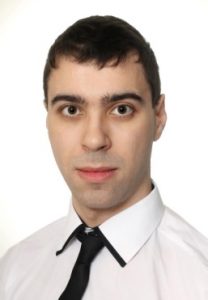 Adrian Ignasiak — has a bachelor degree in Applied Mathematics at the Faculty of Applied and Pure Mathematics at the Wroclaw University of Science and Technology, Poland (2018). Currently is a M.Sc student at the Faculty of Applied and Pure Mathematics at the Wroclaw University of Science and Technology. He works at KGHM CUPRUM R&D Ltd. His areas of interest are signal processing and statistics.
Adrian Ignasiak — has a bachelor degree in Applied Mathematics at the Faculty of Applied and Pure Mathematics at the Wroclaw University of Science and Technology, Poland (2018). Currently is a M.Sc student at the Faculty of Applied and Pure Mathematics at the Wroclaw University of Science and Technology. He works at KGHM CUPRUM R&D Ltd. His areas of interest are signal processing and statistics.
